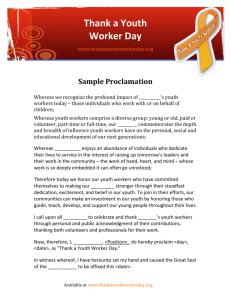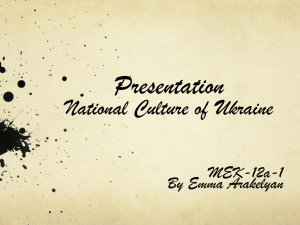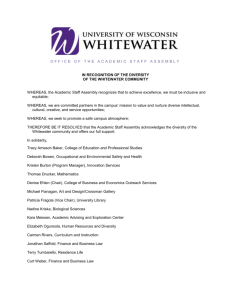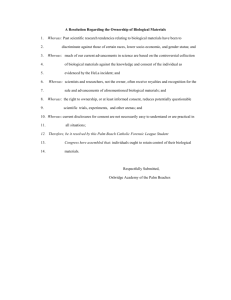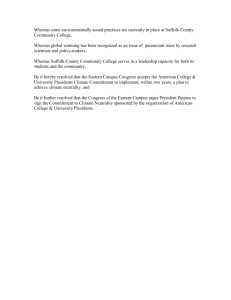- GUE/NGL
advertisement
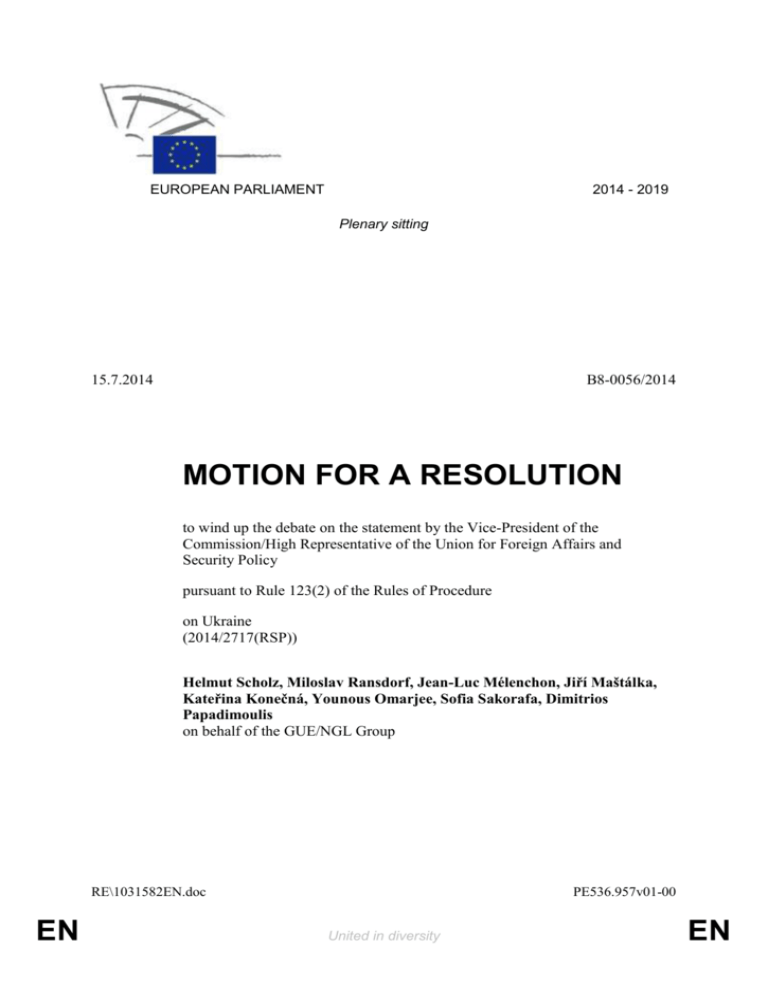
EUROPEAN PARLIAMENT 2014 - 2019 Plenary sitting 15.7.2014 B8-0056/2014 MOTION FOR A RESOLUTION to wind up the debate on the statement by the Vice-President of the Commission/High Representative of the Union for Foreign Affairs and Security Policy pursuant to Rule 123(2) of the Rules of Procedure on Ukraine (2014/2717(RSP)) Helmut Scholz, Miloslav Ransdorf, Jean-Luc Mélenchon, Jiří Maštálka, Kateřina Konečná, Younous Omarjee, Sofia Sakorafa, Dimitrios Papadimoulis on behalf of the GUE/NGL Group RE\1031582EN.doc EN PE536.957v01-00 United in diversity EN B8-0056/2014 European Parliament resolution on Ukraine (2014/2717(RSP)) The European Parliament, – having regard to the report on the human rights situation in Ukraine of the Office of the UN High Commissioner for Human Rights of 15 June 2014, – having regard to Rule 123(2) of its Rules of Procedure, A. whereas political and military confrontation has been ongoing in Ukraine since February 2014, when its president was removed from power after months of political unrest; B. whereas in several cities in eastern Ukraine, following the ousting of President Viktor Yanukovych on 21 February 2014, people in the south-east parts of Ukraine protested against the new government; whereas by mid-March, in several cities, in particular Donetsk and Luhansk, armed groups, initially calling themselves ‘self-defence units’, seized and occupied administrative buildings; whereas their demands ranged from making Ukraine a federation, to the separation of their regions from the rest of Ukraine, to joining Russia; C. whereas in mid-April, the new Ukrainian Government’s Security Service and Interior Ministry began military operations, which the government called an ‘anti-terrorist operation’, first in the Donetsk region and then in the Luhansk region; whereas the Ukrainian Government’s military operations intensified after the early presidential elections, in violation of the promises made by the newly elected President Poroshenko during his election campaign to de-escalate the conflict; D. whereas a 10-day ceasefire was frequently violated by both sides and never achieved the momentum needed to end the violence; whereas President Poroshenko decided to resumed military attacks on Ukraine’s south-eastern regions on 30 June 2014; E. whereas more and more frequently residential areas, hospitals and city infrastructure, including water and electricity plants and schools, are targets of the military actions of the Ukrainian army, the National Guard and other armed formations; whereas according to the report from the Office of the UN High Commissioner for Human Rights of 15 June 2014, 356 people – of whom 257 were civilians, including 14 children – have been killed since the Ukrainian Government began its military operation in the eastern regions of Donetsk and Luhansk; whereas cities under siege are short of food, water and medication; whereas there is evidence that landlines and phosphorous bombs have been used; whereas according to UN data about 160 000 refugees have fled the fighting; whereas according to the UN there are considerable gaps in the State’s ability to protect internally displaced persons; F. whereas the main reasons for the ongoing conflict in Ukraine are unresolved internal PE536.957v01-00 EN 2/6 RE\1031582EN.doc problems; whereas state-society relations in Ukraine are very weak; whereas Ukrainian politics is dominated by oligarchs, with oil and gas traders becoming ministers, governors and heads of major Ukrainian institutions; whereas the main state and democratic institutions – the Parliament, the judiciary and the executive branch of government – are not fulfilling their basic functions of proper representation, defence and governance of the interests of Ukrainian society; whereas there is widespread corruption; whereas according to a recent OECD report the inter-regional disparities are large by OECD standards and are continuing to increase; whereas the human development index deteriorated in most Ukrainian regions during the period 2000-2010; whereas sub-national governments tend to depend heavily on central transfers, the allocation of which they find to be both unpredictable and less than transparent; whereas governments and parliaments fuelled the mistrust and hatred that exist between the different parts of the Ukrainian society by adopting controversial decisions on language, history and international relations; whereas none of these problems has been solved by the recent political change; G. whereas the level of representation of far-right, extreme nationalist and xenophobic politicians in the new Ukrainian Government is extremely worrying; whereas the new government is failing to control the infamous Right Sector; whereas the Communist Party of Ukraine, which has put forward a programme to preserve Ukraine’s unity while protecting the rights of all its citizens faces violent repression, and a legal ban of the party has been instigated, with the party recently being brought to the court; H. whereas a propaganda war is currently taking place between Ukraine, the West and Russia, making it extremely difficult to obtain objective information about the situation in Ukraine; whereas six journalists have been killed and many others have been detained, attacked and harassed; whereas media that are critical of the government, such as the Multimedia Invest Group holding are being discriminated against; I. whereas according to the recent UN report the poverty rate in Ukraine at the beginning of 2014 stood at around 25 %, with 11 million people living in conditions that are less than local social standards; whereas the socio-economic demands of the Maidan movement have been replaced with the neoliberal agenda of the new government, which implements the conditions of the loan from the International Monetary Fund – cuts to vital energy subsidies, in public employment, public sector pensions and deep cuts to social security which have severe consequences for the most vulnerable sections of Ukrainian society; whereas the current military conflict has further aggravated the situation; whereas food prices have increased by 8.2 % on 2013 levels, bringing the socio-economic crisis to many households in Ukraine; J. whereas in May 2014 gas prices in Ukraine increased by 50 % for domestic customers and by 40 % for district heating companies, further rises being scheduled until 2018; whereas instead of negotiating solutions to the existing problems with the implementation of the agreements reached between Russia and Ukraine, both sides are escalating the gas dispute, fuelling the fears and emotions of the Ukrainian population; K. whereas the United States, EU Member States, NATO and Russia are contributing to the conflict by providing major political and material – including military – assistance RE\1031582EN.doc 3/6 PE536.957v01-00 EN to both sides of the conflict; L. whereas the United States reacted to the Ukrainian crisis by adopting a USD 1 billion programme of new military exercises on land, at sea and in the air in Eastern Europe; whereas the newly elected President Poroshenko signed an ‘Agreement on Military Cooperation between the US and Ukraine’ providing the basis for the close involvement of US advisors in the military actions of the Ukrainian Government, the modernisation and reconstruction of the army and the whole security sector; M. whereas NATO is misusing the crisis in Ukraine for its revival and new confrontation with Russia, having increased the number of manoeuvres in Eastern European countries, and it will consider at its summit in September 2014 new military strategies and deployments in Eastern Europe, in violation of the 1997 NATO-Russia Founding Act whereby NATO pledged no ‘additional permanent stationing of substantial combat forces’ in Eastern Europe; N. whereas the EU continues to turn a blind eye to the real situation in Ukraine and uncritically supports the Ukrainian Government; whereas the EU is continuing its sanctions policy against Russia; whereas the EU-Ukraine Association Agreement, which includes a Comprehensive Free Trade Agreement, has been signed despite concerns of and resistance by major parts of the Ukrainian population; whereas the Commission has agreed on a number of concrete measures for short- and medium-term assistance for Ukraine; 1. Expresses grave concern at the resumption of military confrontation in eastern Ukraine; issues a strong call to President Poroshenko to stop the military action; calls urgently on all sides to agree to the immediate resumption of the ceasefire and to work towards the definitive cessation of violence through a political and diplomatic process; 2. Stresses that the current deep political crisis in Ukraine cannot be resolved by military means, but needs a profound nationwide debate on the necessary constitutional, political and economic reforms, and the geopolitical orientation of the country; 3. Calls on Russia, the EU and the US to stop fuelling the conflict by providing political and material – including military – support to the parties of the conflict, and to start contributing to the creation of a new social pact between the different parts of the country, recognising Ukrainian diversity as a largely positive element of Ukrainian identity, and to work towards the territorial integrity and sovereignty of the country; 4. Calls for an arms embargo against all parties of the conflict, and for the withdrawal of all foreign military advisors and other military personnel from Ukraine; 5. Calls on all stakeholders to refrain from using messages of intolerance or expressions which may incite hatred, violence, hostility, discrimination or radicalisation; 6. Supports the reinforcement of the role of the Organisation for Security and Co-operation in Europe (OSCE) in the settlement of the Ukrainian crisis; calls for the implementation of the ‘roadmap’ developed by the Swiss presidency which constitutes a good foundation for an exit from the crisis by political means; PE536.957v01-00 EN 4/6 RE\1031582EN.doc 7. Expresses its deep sympathies with the families of the civilian victims of the conflict; condemns the severe violation of international humanitarian law in the areas of the military conflict committed by both sides; calls for an independent investigation of all human rights abuses and the prosecution of those responsible; 8. Expresses deep concern at the worsening humanitarian crisis in the conflict areas; calls on all sides of the conflict to facilitate access for international organisations to the areas affected by the security operations so that the real needs of the population can be assessed and addressed; 9. Calls for an independent and comprehensive investigation of all human rights violations, and in particular war crimes, those related to the violence in Odesa of 2 May 2014, and those related to the Maidan protests, as well as an investigation of perpetrators of injustice; underlines the fact that this process should be conducted in a way which ensures confidence in the investigation and trial, thereby enabling the communities affected to accept fully the result of such an investigation; 10. Expresses deep concern at the consequences of the policies which were decided by the new government following the conditions set by the International Monetary Fund (IMF) and the EU; denounces the fact that the peoples of Ukraine have to pay for the failed policy of former governments instead of the Ukrainian oligarchs being taxed; 11. Expresses deep concern at the unstable energy security policy of Ukraine and its consequences for citizens; calls on Russia and Ukraine to resume constructive economic and energy cooperation with a view to ensuring that energy prices are affordable for all, and to refrain from using energy and trade as a political tool; 12. Calls urgently on Ukrainian and international politicians to exercise restraint and to refrain from statements which could further escalate the conflict; is extremely concerned at the propaganda war being waged by all sides; calls on all sides to provide the necessary conditions for journalists and other media workers whose work is essential for an objective assessment of the situation in all parts of Ukraine; 13. Expresses deep concern at the political role of the far-right, extreme nationalist and xenophobic forces in Ukrainian politics; condemns the attacks against the Communist Party, as well as the efforts to ban it; 14. Expresses serious concern at the growing political confrontation between NATO and Russia and the danger of a new arms race; warns that failure to open a results-oriented dialogue could have dangerous consequences for peace and security in Europe and the world; 15. Notes that a policy which separates Eastern Neighbourhood policy from the development of EU-Russia relations has failed; underlines the need to redesign Eastern Neighbourhood policy with a view to developing regional cooperation which does not exclude any country; calls on Russia to proactively participate in such a process and to show its willingness to take part in good neighbourhood policies; 16. Welcomes the opening of the dialogue between the EU, Ukraine and Russia on RE\1031582EN.doc 5/6 PE536.957v01-00 EN measures to avoid negative consequences of the EU-Ukraine association agreement for cooperation between Ukraine and Russia and the Customs Union; 17. Instructs its President to forward this resolution to the Council, the Commission, the parliament and Government of Ukraine and the Parliamentary Assemblies of the OSCE and the Council of Europe. PE536.957v01-00 EN 6/6 RE\1031582EN.doc
